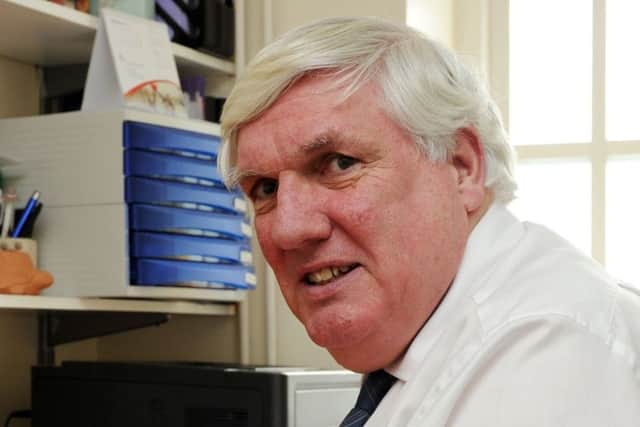Special report: Banburyshire GPs encourage getting flu jab to avoid illness


Those who have suffered from the virus have reported feeling very poorly and unable to get out of bed.
GP Hugh Gillies said it is not too late to get the jab, which is free for people in certain high-risk categories.
Advertisement
Hide AdAdvertisement
Hide AdHe gave his advice after news reports revealed that the NHS has obtained a trivalent rather than quadrivalent vaccine this year which covers more of the strains of the flu virus.


“I would definitely recommend people have the adult flu vaccine especially if they are in one of the high risk groups. It is free for higher risk groups under the NHS,” he said.
“The flu vaccine doesn’t cover all strains of flu but is still better than nothing and has a good chance of preventing flu or reducing its severity if you come into contact with it.
“If you are not in a high risk group then the benefits are less and you might consider paying for it from a local pharmacy at a small cost.
Advertisement
Hide AdAdvertisement
Hide Ad“I understand local surgeries have vaccine supplies and are keen to vaccinate the high risk groups , both adults and children, who may have missed out on the initial rollout of the vaccine programme in the autumn.


“The children have to be within a certain age in September to qualify for their nasal dose and they do get the quadrivalent vaccine,” he said.
The GP said vaccination promoted reduced infectivity and reduced onward transmission to others.
“The present flu is of different stains, as are the vaccines which are effective. People should avoid going to work if they have flu,” he said.
Advertisement
Hide AdAdvertisement
Hide AdHe said it was still sensible to have the flu jab even if you do not know if you have been in contact with a sufferer.
“The only reason not to have it is when you are unwell, as the body would be fighting the jab to produce immunity as well as fighting current illness too,” he said.
“There are two or three strains of the flu circulating at present and the strains mutate a bit too.
“Flu tends to develop in the East and comes towards us six months later in the winter. The vaccines made and used have a number of strains in them.
Advertisement
Hide AdAdvertisement
Hide Ad“Australia has had a high prevalence of flu and I understand the main strain isn’t in the vaccine that is commonly given this year to UK adults.
“It’s too late to have time to make the Australian strain although if there is some available I am sure it will be being retained for special high risk cases.
“The trivalent vaccine is still worth having as it still protects against the other strains.”
Experience shows value of vaccine
The number of flu cases is higher in the winter months and contributes to the pressures on hospital services.
Advertisement
Hide AdAdvertisement
Hide AdA disease of the lungs and upper airways, the flu virus spreads in the lungs and airways and in vulnerable patients, complications such as pneumonia can develop demanding more intensive treatment.
Hospitals all around the country have been struggling with emergency admissions of ill people.
The Oxford University Hospitals NHS Foundation Trust (OUH) which runs the Horton briefly declared the highest level of pressure – black alert – at the start of the month.
A shortage of beds meant some planned operations had to be cancelled to free up bed space and the kidney dialysis unit was comandeered as an emergency assessment unit to ease congestion in A&E.
Advertisement
Hide AdAdvertisement
Hide AdThe OUH was unable to say how many of the emergencies were connected with winter flu cases.
However medical director Dr Tony Berendt said: “National and local figures show that flu transmission is increasing.
“All strains of flu can make people very unwell and lead to serious health complications.
“It is difficult to make comparisons with last year at this stage, as the unpredictable nature of flu means that it can peak at different times in different years.
Advertisement
Hide AdAdvertisement
Hide Ad“Therefore we can only make an accurate, reliable comparison towards the end of the flu season.
“We continue to encourage all our clinical staff who have not yet been immunised to have the vaccine, although we are pleased to report that just under 70 per cent of staff have been immunised.
“It is also important for the public, particularly at-risk groups (children, the elderly and those with pre-existing respiratory conditions such as asthma) to get vaccinated to help reduce the spread of flu in the community.”
According to the latest official statistics, as of November 2017, 66.4 per cent of OUH frontline staff had received the flu vaccine compared with just over 62 per cent in 2016.
Who is in the high risk group?
Advertisement
Hide AdAdvertisement
Hide AdWithout the flu vaccines that are given currently, many of the elderly would not be alive now today although many still succumb to flu despite vaccines, says Dr Gillies.
The doctor recommends the current trivalent vaccine to high-risk groups for complications.
These include the over 65s, those with diabetes, asthma on steroid inhalers, chest disease and also anyone who is an essential carer for someone in those groups.
The jab is free on the NHS via your GP surgery.
Those not in the high risk groups can still get the vaccine from pharmacies, if supplies exist.
Advertisement
Hide AdAdvertisement
Hide AdFor more details about flu strains, vaccines, high-risk groups and practical information eg incubation, prevention of infection and expected recovery time see https://www.nhs.uk/conditions/flu.
What to do if you think you have the flu
Flu symptoms come on very quickly and can include a sudden fever – a temperature of 38C or above , an aching body, feeling tired or exhausted, a dry, chesty cough, a sore throat, headache, difficulty sleeping, loss of appetite, diarrhoea or tummy pain and nausea and being sick.
The symptoms are similar for children but they can also get pain in their ear and appear less active.
According to the NHS, the difference between a flu and a cold is that flu comes on quickly where a cold develops gradually.
Advertisement
Hide AdAdvertisement
Hide AdFlu affects more than just your nose and throat and it makes you exhausted and too unwell to carry on normally, according to www.nhs.uk
A cold is nasty but you are able to carry on normally, for example, going to work.
A pharmacist can give treatment advice and recommend flu remedies.
However patients should be careful not to use them if they are taking paracetamol and ibuprofen tablets as it’s easy to take more than the recommended dose.
Advertisement
Hide AdAdvertisement
Hide AdNHS recommends that you should see your GP if you are worried about your child’s symptoms, if you are 65 or over, if you are pregnant, if you have a long-term medical condition such as diabetes or a heart, lung, kidney or neurological disease, if you have a weakened immune system – for example, because of chemotherapy or HIV or if your symptoms don’t improve after seven days.
Antibiotics are not usually prescribed for flu as it is a virus and they are ineffective.
However if the flu develops into a chest infection, for example, you may need antibiotics.
Flu is very infectious especially in the first five days. Germs can live on hands and surfaces for 24 hours so wash hands often, use tissues to when sneezing and bin them.
Some recommend taking supplements including Vitamin C and Zinc to bolster the immune system.